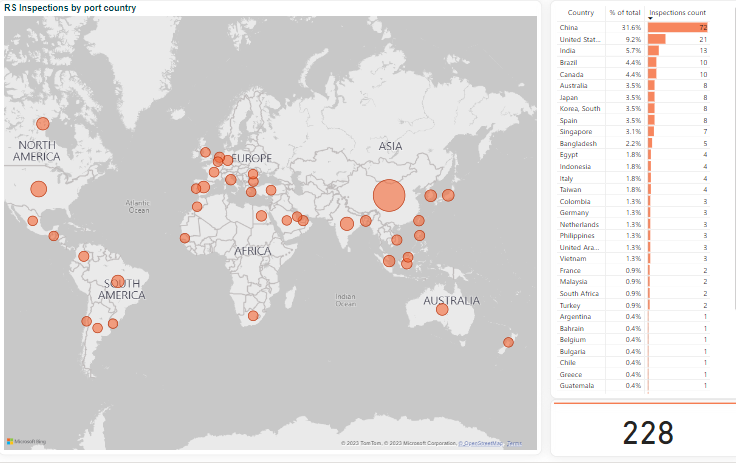RISQ improvements – RISQ 3.0 (incorporating clarifications and improvements was implemented on 3 July 2023. Please access the document from our website here: https://explore.rightship.com/RISQ

Planning requirements - Owners/Managers are strongly encouraged to start planning at least 2 months in advance of existing inspection expiry and explore options with the dry inspections team if required. It is Owners/Managers responsibility to ensure a valid inspection is in place where required for potential Charterer needs, and for the vessel to be considered for a vet recommendation. The RightShip Platform provides transparency of the expiring status and countdown from when 60-days remaining validity is reached until expiry. Where expected port time is less than the time required for a standard RISQ inspection, please note that Managers may request:
- Hybrid Inspection where documents are required to be uploaded for review at least 7 days in advance of the physical inspection, or
- Dual Inspection where two inspectors are assigned to complete the inspection.
Inspection Validity – Where vessels substantially meet RISQ at the time of Inspection, the maximum validity of 12 months validity is allocated. For Inspections that do not substantially meet RISQ, the breadth and seriousness of shortcomings and quality of actions is considered in allocating an appropriate validity to allow for gaps in onboard SMS standards and performance to be addressed by Owners/Managers. Guidance is:
- 12 Months – low number of lower risk NC’s/Findings. No substantive nature NC/Finding.
- 9 months validity - average number of lower risk NC/Findings or low number of NC/Findings with med risk nature NC/Findings.
- 6 months – above average NC’s/Findings including some of a med/high nature and/or repeat NCs from previous Inspections.
- 3 months – high number of NC’s/Findings particularly regulatory, med to high risk, some potentially detainable at PSC.
- Unacceptable – high number of NC’s/Findings, with higher risk, multiple potentially detainable NC/Findings at PSC
Inspection location - Alongside at Discharge ports remain the preference for Inspector attendance as this will likely provide greater certainty of timing, provide a bigger window of opportunity for an inspection to be progressed and reduce disruption to a busy crew. Despite advice that Inspector boarding is deemed unsafe due to their exposed nature we continue to see applications for inspections at Brazilian anchorages. Owners/Managers should plan ahead to ensure forward inspection coverage is in place and not consider such anchorages as an option.
Due to the disruption to shipboard routines, inspections should only be planned for Dry-dock/layby periods as a last resort and then they must be arranged to take place when all shore involvement has been completed and the vessel is in all respects ready to sail, likely at the waiting anchorage. Inspectors have been instructed to list findings where they board and equipment remains under repair or normal shipboard routines remain disrupted and these will invariably result in a reduced validity or unacceptable outcome in the RightShip Inspection final assessment. It is a better option to Inspect at the final discharge port before Drydocking/layby - while items that are scheduled for repair/replacement may be listed as findings, these can be closed by providing objective evidence in the subsequent close out.
India – Director General of Shipping. RightShip have been alerted to notations in the recent DGS Order No. 06 of 2023 that relates to compliance requirements for vessels calling at Indian ports aged between 15-25 years. ”RightShip Inspection or an evaluation by an RO under equivalent rating methodology developed by the DGS” was stated by DGS as meeting their requirements. We would be more than happy to assist any Owners/Managers with RightShip Inspection arrangements upon application.
Engaging with the Inspector – code of conduct - We reiterate that our Inspectors adhere to the RightShip code of conduct and will uphold the professionalism and integrity while carrying out the inspection. We recognize that good managers operate within similar conduct expectations, it is an important reminder that any attempts to coerce or offer bribes at any point during the inspection will not be tolerated. Please note that RightShip Inspectors will report any cases of attempted coercion or attempts to manipulate Inspection outcomes. In these cases, the Inspection will likely be deemed unacceptable.
Third Party RISQ training/pre-inspections - The decision was taken by RightShip at the time of development that RISQ (RightShip Inspection Ship Questionnaire) would not be subjected to copyright and would be made available as a contribution to improving safety standards in the dry bulk industry and advancing its goal of a zero-harm maritime environment. Since its deployment, we have seen several companies use the RISQ document to advertise services such as “Crew training in RISQ” and “Pre-RightShip Inspections”. These services are not endorsed by RightShip and those who choose to use them should undertake their own assessment and due diligence with respect to any claims made about their benefit. It is RightShip’s view that the comprehensive nature of the RISQ document with its guide to inspection for most questions, is such that when properly implemented by competent Owners/Ship Managers following an SMS (Safety Management System) gap assessment and internal training where necessary, should not require external crew training or pre-inspection by third parties.
.png.webp)